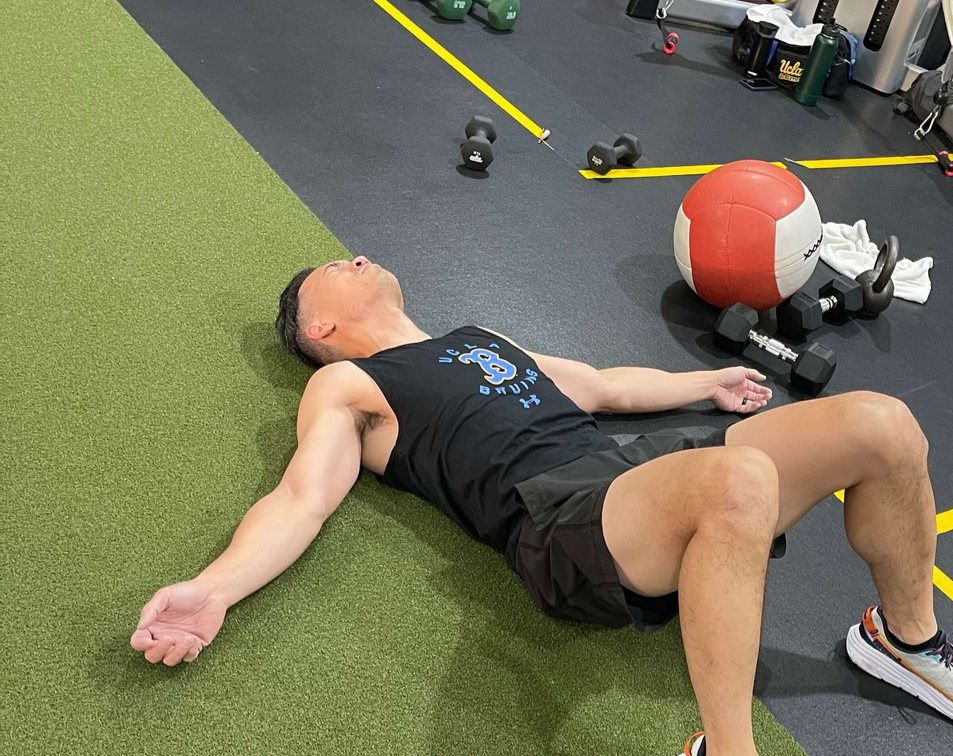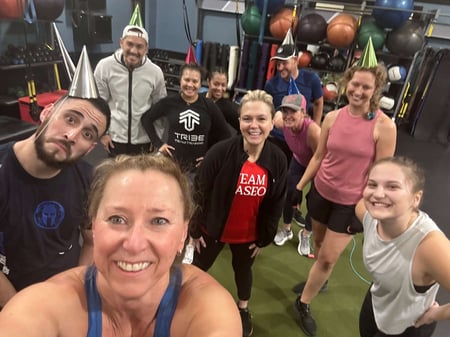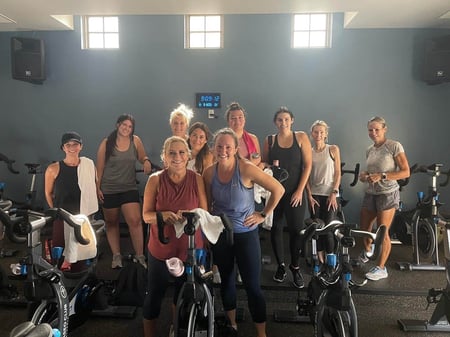The problem with the obsession with fitness — and why it is not healthy
May 29th, 2023 | 5 min. read
By Jen Azevedo

We all fall prey to obsessive thoughts. But for some people, obsessing about fitness has become a full-time, uncontrolled condition. This condition can interfere with work, school, health, and relationships.
Obsessions are repetitive thoughts, urges, or mental images that cause anxiety. People act out their compulsions when they seek relief from negative thought patterns.
While regular exercise is an important component of a healthy lifestyle, an excessive focus on fitness can lead to burnout, injury, and other negative emotional and mental consequences.
The Paseo Club has supported members in meeting their fitness goals for almost twenty years. We recognize that exercise is just one part of being healthy and that balance is the key to wellness.
In this article, we share with you why people are obsessed with fitness, what the psychological issues are behind this obsession, and how to create a healthy relationship with exercise,
.png?width=400&height=394&name=crop_Compressed_IMG_9574%20-%20Edited%20(2).png) Why are people obsessed with exercise?
Why are people obsessed with exercise?
People can become obsessed with fitness, turning a healthy activity into a compulsion and possibly an addiction. People often obsess about exercise to manage stress, anxiety, and insecurity.
Everyone feels immense pressure to look good. Unfortunately, society’s idea of beauty is limited, and the desire to conform to a specific body type can be all-consuming.
Social media plays an influential role in many people’s lives, encouraging, pressuring, or even shaming viewers to push harder to get the results the Instastar is already modeling.
Ironically, exercise can be a positive feedback loop system, reinforcing the need to exercise more.
When people exercise, it causes chemicals in the nervous system to release, creating a sense of pleasure or reward. Exercise addiction may be, in part, a dependence on this pleasure response.
What are some issues that people are trying to manage with chronic exercise?
When people engage in obsessive behavior, they use the substance or their actions to manage certain aspects of their life that feel out of control or scary.
A desire for physical improvement
Many people start to exercise to improve their physical health or to achieve a specific body shape or weight. This desire can lead to constant pressure to improve and maintain their fitness level.
Psychological benefits
Research has proved that exercise has several psychological benefits, such as reducing stress, improving mood, and boosting self-esteem. These benefits can create a positive feedback loop where individuals feel compelled to continue exercising to maintain these positive effects.
Social pressure
The pressure to fit in with certain social groups or to meet set standards of physical appearance can also contribute to exercise obsession. This pressure can come from peers and media — even personal trainers and fitness professionals.
Addiction
In some cases, exercise can become addictive due to the release of endorphins and other chemicals in the brain. This chemical change can lead to a compulsive need to exercise even when it is not necessary or healthy.
Control
For some people, exercise can become a way to exert control over their lives or to cope with stress or anxiety. This approach can lead to a desire to exercise excessively or to become overly strict with diet and exercise habits.
 What are the signs and symptoms of obsessive exercising?
What are the signs and symptoms of obsessive exercising?
Signs and symptoms that indicate someone has become obsessed with fitness are:
- They are never satisfied with their achievements
- They reduce their food intake if they don’t exercise
- They exercise more after eating dessert or a big meal
- They are anxious about their weight and exercise routine
- They give up other activities to make more time for exercise
- They refuse to miss a workout — even if they are tired, sick, or injured
- They base their self-worth on the number of workouts completed or calories burned
What are the side effects of chronic exercise?
Excess exercise can wreak havoc on your body and mind. The effects can be short-term and long-term.Short-term side effects can include:
- Injury
- Fatigue
- Irritability
- Insomnia
- Dizziness
- Headache
- Muscle soreness
- Dehydration (if not drinking enough)
Long-term effects can include:
- Infertility
- Lack of focus
- Social isolation
- Muscle atrophy
- Sleep disruption
- Eating disorders
- Irregular menses
- Memory problems
- Inability to concentrate
- Hormonal irregularities
- Osteopenia (loss of bone mass)
- Osteoporosis (weakening of bones)
.png?width=475&height=324&name=crop_comp_IMG-2720%20-%20Edited%20(1).png) How do you know if you have a healthy relationship with exercise?
How do you know if you have a healthy relationship with exercise?
Unlike alcohol or cigarettes, exercise should be integral in life. We all need to practice a combination of aerobic and resistance exercises (with a dash of mobility sprinkled in) for optimal physical and mental/emotional health.
A balanced approach to exercise involves three factors…
- consistency but also flexibility
- a willingness to challenge yourself but not push beyond safety
- making exercise an enjoyable part of your life in addition to many other interests or hobbies.
If you feel compulsive about exercising, what steps can you take?
If you suspect you have an unhealthy relationship with exercise, you may want to consider making some lifestyle changes.
Here are some steps to bring more balance to your life.
Stop tracking
Fitness trackers are a double-edged sword. They can provide you with a ton of helpful information that you cannot easily get elsewhere, but the data can be a way to micromanage calories burnt, steps taken, or how many minutes you trained (or didn’t train!) each day.
Setting the tracker aside can help you let go of strict goal-setting. Instead, practice listening to your body about its needs and capacity.
.jpg?width=450&height=338&name=IMG-3395%20(1).jpg) Pay attention to your body
Pay attention to your body
When we follow a specific protocol for exercising, (and eating, since they often go hand-in-hand), the program is thinking for us. The problem is that sometimes we are tired, sick, injured, sad, or busy and simply need a break.
If we ignore that inner voice, the risk of fatigue, becoming overextended, or even injury skyrockets. More importantly, the guilt can feel insurmountable, crippling us with negative self-talk.
Eat healthy and imperfectly
For many people, obsessive exercise is closely paired with obsessive eating. Calorie counting, weighing and measuring meals, denial, and rewards of certain foods are all potential signs of an unhealthy relationship with food.
We all know the basics of how to eat — lots of fresh produce, minimally processed foods, lean protein, healthy carbs, and fats.
But how many of us eat according to hunger?
Explore eating regularly and healthfully, trying to stick to the Mediterranean Diet as much as possible. BUT allow yourself pizza, chocolate, or whatever your kryptonite used to be, and see what it is like to enjoy it (on occasion) without guilt and self-incrimination.
Customize your approach
Your body's needs for exercise, rest, and eating will be different from other people. That is ok. Maybe you eat three large meals a day, or it could be seven small ones. Perhaps you sleep seven hours, but it might be nine. Maybe you love yoga and hiking, but your friend loves HIIT. There is more than one way to be healthy. Explore what your body needs to feel good.
Accept the genetics you are given
It has become widely accepted that there are (at least) three unique body types.
Endomorph is a larger body type that is stockier and holds weight in the hips and belly areas.
Mesomorphs have medium-sized bodies, and tend to have wider shoulders and an athletic build.
Ectomorphs have a narrow build and high metabolism. They do not tend to gain fat or muscle easily.
We are all born with an inherent body type. Some people will never be a size 2, no matter how much they exercise. Alternately, others will never be able to add the muscle mass and strength they would like to see.
There are limitations to what people can look like based on the body type they are born with.
 Surround yourself with supportive people
Surround yourself with supportive people
It cannot be underestimated how important a supportive community is for our well-being. Research shows good friends can provide a sense of belonging and purpose.
Choose friends that encourage your hopes and can be a reliable source of advice and aid when you struggle.
Reduce (or remove) the social media gurus you follow
Social media is entrenched in our minds and our psyches. It influences how we feel about ourselves and our appearance.
When people stop viewing social media, stress, anxiety, and depression are significantly reduced.
 Final thoughts on exercising with balance
Final thoughts on exercising with balance
True health encompasses not only physical fitness but also mental and emotional well-being. Focusing solely on physical fitness while neglecting other aspects of health can lead to an imbalanced approach to wellness.
It is critical to address any underlying emotional or psychological issues that contribute to obsessive exercising. Seeking the help of a therapist or counselor can be a beneficial way to work through these issues and develop a balanced and sustainable approach to exercise and overall well-being.
The Paseo Club is a social club created to support the health and well-being of the residents of the Santa Clarita community. We know that exercising is only one facet of wellness and good nutrition, an active social life, and enough rest are just as important.
The Paseo Club offers over 60 exercise classes per week, tennis and pickleball courts, and a junior-Olympic pool. When members aren’t working out, they are relaxing at our on-site spa, sharing a meal with friends or family at the cafe, or enjoying one of our weekly social events, such as Wine Down Wednesday.
If you think being part of a community that shares a love of health and social connections is for you, then join the Paseo Club today.
Jen Azevedo is a tennis professional, pickleball professional, personal trainer, group exercise instructor, and the general manager of the Paseo Club. She loves the community at the Paseo Club and that it is also a safe and fun place for her daughter. Jen’s favorite activities are joining her tribe for trail races or her partners for tennis matches. Occasionally Jen slows down to relax with a book — she reads over 100 a year!
Topics:


.png?width=400&height=344&name=cropped_compressedSusan2%20-%20Edited%20(2).png)